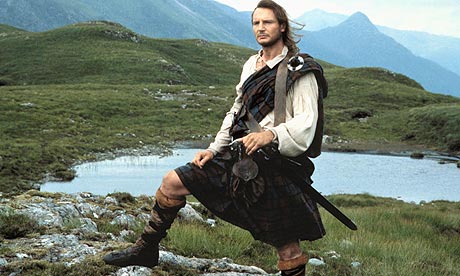As I think of recent popular time travel novels, first came Outlander (1992) by Diana Gabaldon. It was a romance novel, published as a romance novel, for romance readers, which drew in readers by the tens of thousands, across all genre boundaries: fantasy, hiistorical, novel, romance, adventure. It spawned a very successful series. I loved Outlander, but the following novels lacked the excitement of fresh exploration, instead were forumulaic, so I didn't bother with them. However, I found that same excitement in the movie Rob Roy (1995), even though it was based on the novel by Sir Walter Scott (1817). Rob Roy had the parts I enjoyed particularly, and left out the parts that I skimmed in Outlander, i.e. 'the present' and the protagonist needing to learn her new world -- and the lovers were already married, they didn't need to court -- while very sexy and romantic. Plus a terrific music score. (I still like writing to the cd.) At the end of last year it was announced that a television miniseries was in the works.
The Time Traveler's Wife (2003) by Audrey Niffenegger was both a literary and popular success (though the film (2009) didn't seem to carry the same impact at the box office as the novel did for readers). Evidently the literary qualities that worked so beautifully on the page didn't translate to the screen. I enjoyed reading The Time Traveler's Wife very much -- but movie's scenes between the love interest when he was older and the wife was still a kid felt just a little weird, shall we say?
Then, along came Deborah Harkness in 2011 with Discovery of Witches, the first novel in the projected All Souls Trilogy ( followed by Shadow of Night in 2012 -- the trade which is out now, ahead of the third installment). I fell into a passionate relationship with both these books in a way I seldom am able to to do with a novel these days. I am so curious to see how Harkness, an historian no less, who specializes in the Elizabethan era to which we jump back in time, concludes what she's begun so colorfully. I want to know the answers to the questions of biology, physics and life that are posed in these novels as much as the protagonists do. There is a movie in the works for Discovery of Witches; Harkness announced in February a screenplay was finished.
And now there's a new time travel novel, The River of No Return (2013) by Bee Ridgway. I've only gotten started with this one, but am liking it very much. When I'm further along reading it may become more clear to me why I'm thinking it owes something to Harkness, besides Ridgway being, like Harkness, an academic at at prestigious institution.
In the meantime we have time travel on television. Continuum, a Canadian production, is filled with the joys of the tech we are currently working on, as perfected in 2077, and dragged back into 2012. My biggest criticism of the first season, which is the only one I've seen, was the mandatory shoot-em-up-beat-on-each-other scenes that run for a good five minutes or more -- at least so it seems -- in every episode. I haven't figured out the politics of it yet either. But it is kind of endearing to have the era of 2012, filled with toxic air, bank failures, corporate criminality too big to fail, etc., looking like a paradise to a 2077 time jumper.
Fox is putting up another time jump series this fall, Sleepy Hollow, which seems to have thrown together American history, past and present, into the same kind of non-historical, faux mystical chumble as a Dan Brown novel. Or, as Abraham Lincoln Vampire Hunter. In any case it's Ichabod Crane as you've never seen him or imagined him before -- sexy, handsome, brave, effective, fighting in the American Revolution! And then zapped to the present to join fighting crime.
This probably isn't a trend, is it? Or anything new, either. It's all still about immortality one way or another -- i.e. vampires, whether they have two legs or are corporations.
Subscribe to:
Post Comments (Atom)



No comments:
Post a Comment